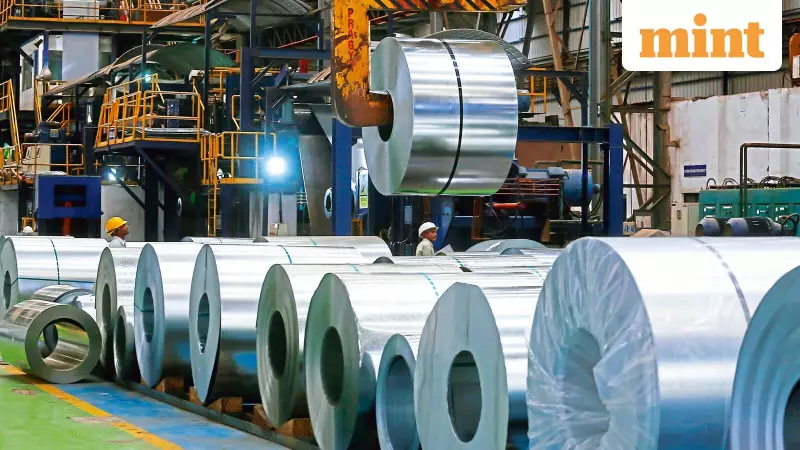
New Delhi witnessed a significant environmental milestone on Thursday as policy think-tank iFOREST unveiled India's first comprehensive Environmental, Social, and Governance (ESG) report specifically designed for the steel industry. This groundbreaking initiative establishes a standardized system to monitor and report carbon emissions while enhancing sustainability disclosures across the sector.
Addressing Global Trade Challenges
The report arrives at a crucial juncture for India's steel industry, which faces increasing global pressure to decarbonize. The European Union's Carbon Border Adjustment Mechanism (CBAM) and similar trade barriers being implemented by Western economies have made reducing carbon intensity an urgent priority for Indian steel exporters.
Chandra Bhushan, CEO of iFOREST, emphasized the financial implications during the report launch. "India requires trillions of dollars in climate finance to achieve its mitigation and adaptation targets," he stated. "To attract this level of investment, we need three key elements: a clear climate finance taxonomy, a definitive policy roadmap for sectoral decarbonization, and credible, comparable data to guide investment decisions. Our current work focuses on this final pillar—ensuring transparent ESG reporting for the steel sector."
Critical Findings and Sector Analysis
The comprehensive study examined 31 reporting companies representing 65% of India's crude steel production and 60% of sector revenue. The findings revealed substantial environmental challenges:
The analysis found that the sector emitted 221 million tonnes of carbon dioxide equivalent (CO₂e) in FY24, with an emission intensity of 2.54 tCO₂e per tonne of steel—significantly higher than the global average of 1.92 tCO₂e/t.
Renewable energy accounts for less than 0.5% of total energy consumption in the industry, while nearly half of water withdrawals occur in water-stressed regions, highlighting resource sustainability concerns.
Social and Governance Gaps Identified
The report uncovered persistent social and governance challenges within the steel sector. Women constitute only 18% of board members and 7% of key managerial positions, while 56% of the workforce is employed on contractual basis. Additionally, merely 16 companies have established formal anti-corruption frameworks.
Alok Sahay, Secretary General of the Indian Steel Association, emphasized the sector's broader significance. "Steel in India serves more than industrial purposes—it fulfills crucial social objectives. The industry requires an investment of approximately ₹9 lakh crore to fund its green transformation initiatives. The unified GHG accounting and MRV framework, along with the ESG supplement released today, will play a vital role in disclosing comparable and verifiable information to attract this investment."
Pathway to Sustainable Steel Production
India has already initiated measures to reduce its steel sector's carbon intensity by developing a green steel taxonomy. The implementation of internationally accepted Greenhouse Gas accounting and Monitoring, Reporting & Verification (MRV) frameworks represents the next crucial step toward environmental compliance.
Sanjeev Kanchan, Director of Industrial Decarbonization & ESG at iFOREST, highlighted the importance of sector-specific templates. "The BRSR Supplement provides a clear pathway for consistency, comparability, and credibility in ESG reporting for resource-intensive industries like steel."
The iron and steel industry, among India's most energy-intensive sectors, contributes approximately 12% of the nation's carbon dioxide emissions. With steel production projected to increase from 140 million tonnes in 2023 to 255 million tonnes by 2030, and potentially reaching 500 million tonnes by 2050, the sector's decarbonization becomes critical for India's 2070 net-zero targets.
Former SEBI Chairman Ajay Tyagi outlined the necessary steps forward: "Developing sector-specific BRSR reporting guidelines will provide investors with credible information. Establishing sectoral GHG emission targets, supported by robust MRV systems, is essential to achieve net zero objectives. Along with improved disclosure, we require a well-defined taxonomy to drive investments."
The event, hosted in partnership with the Indian Steel Association, featured the launch of three pivotal reports: BRSR Disclosure: ESG Performance of the Steel Sector (2023–24); BRSR Supplement for the Steel Sector: Enhancing ESG Disclosure and Transparency; and Unified GHG Accounting and MRV Framework for the Iron and Steel Sector.
To resolve inconsistencies in emissions reporting, iFOREST introduced a unified India-specific GHG accounting tool that simplifies and standardizes emissions tracking across the industry.






